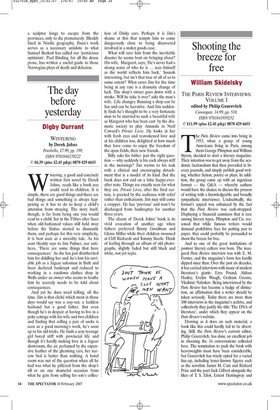The day before yesterday
Digby Durrant WINTERING by Derek Johns Potobello, f7.99, pp. 199, ISBN 9781846270222 © £6.39 (plus £2.45 p&p) 0870 429 6655 Wintering, a good and concisely written first novel by Derek Johns, reads like a book you could read to children. It is simple, there are good things and there are bad things and something is always happening as it has to do to keep a child's attention from straying. The story itself, though, is far from being one you would read to a child. Set in the Fifties after Suez when old-fashioned values still held sway before the Sixties started to dismantle them, and perhaps for this very simplicity, it is best seen as a morality tale. As his aunt bleakly says to Jim Palmer, our antihero, 'There are some things that have consequences.' As she has just disinherited him for diddling her and he's lost his enviable job as a Jaguar salesman in Bath and been declared bankrupt and reduced to working in a rundown clothes shop in Wells under an owner who seems to loathe him he scarcely needs to be told about consequences.
And yet he does need telling, all the time. Jim is that cliché which most in those days would say was a cop-out, a feckless husband but a good father. But even though he's in despair at having to live in a poky cottage with his wife and two children and finding that selling a pair of socks is seen as a good morning's work, he's soon up to his old tricks. He finds a sexy teenage girl bored stiff with provincial life and though it's hardly making love in a Jaguar showroom, the air perfumed by the expensive leather of the gleaming cars, her narrow bed is better than nothing. A hotel room was out of the question when all he had was what he pilfered from the shop's till or on one shameful occasion from what he gets from selling his son's collection of Dinky cars. Perhaps it is Jim's shame at this that tempts him to come dangerously close to being discovered involved in a stolen goods case.
What will save him from the inevitable disaster he seems bent on bringing about? His wife, Margaret, says, 'He's never had a strong sense of who he is ... sees himself as the world reflects him back.' Sounds interesting, but isn't that true of all of us to some extent? What saves Jim for the time being at any rate is a dramatic change of luck. The shop's owner goes down with a stroke. Will he take it over? asks the man's wife. Life changes. Running a shop can be fun and can be lucrative. And Jim suddenly finds he's thought to be a very fortunate man to be married to such a beautiful wife as Margaret who has been cast by the dramatic society to play Amanda in Noel Coward's Private Lives. He looks at her with fresh eyes and reawakened love and at his children too, delighted at how much they have come to enjoy the freedom of the open fields, their new friends.
Billy asks his father just the right question — why suddenly is his cock always stiff in the mornings? Jim warms to his task with a clinical and encouraging detachment that is a model of its kind. But the book does not end on a false happy-everafter note. Things are exactly seen for what they are. Private Lives, after the final curtain, is greeted by the audience with relief rather than enthusiasm. Jim may still come a cropper. He has 'previous' and won't be discharged from bankruptcy for another three years.
The charm of Derek Johns' book is its vivid evocation of another age when fathers preferred Benny Goodman and Glenn Miller while their children swooned at Cliff Richards and Tommy Steele. Think of leafing through an album of old photographs, slightly faded but still black and white, not yet sepia.













































 Previous page
Previous page